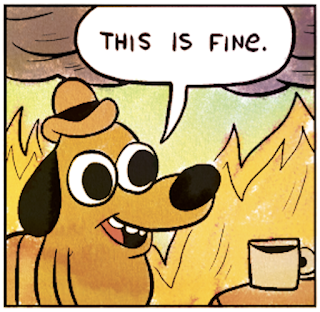It was a lovely afternoon at the beginning of December when I wrote these lines.
Vy was at her class in the uni and I had the entire apartment just for myself. So it was quiet. Golden sunshine cast on everything, the breeze was pleasing, and the view over the canal was gorgeous. Despite that. I felt uneasy. Felt like there was something I should be doing, that I was losing my time but I couldn't figure out which. And that had been how I felt this whole year - things were dashing by and I was just trying to catch up.
A little reminder for future people about what kind of year 2022 was. It was the year when Tuan-Anh got married, Soc was born, and the whole world finally came out of Covid-19 after three years of social isolation and economic stagnation hoping for post-pandemic growth. Things perhaps would finally feel normal again. Except Putin said fuck that and evaded Ukraine with his little special military operation. The oil price was all over the place. No country seemed to agree with one another. In Vietnam, there were widespread layoffs because orders in the West were drying up. And in Saigon just last October you literally could not find gas for your motorbike.
The master's degree.
No, it wasn't me. That was why Vy was at the uni on a lovely Sunday afternoon. She got a scholarship at the same place I got my bachelor's.
I was told that a master's degree is like doping. You use it when your career hits a plateau and you need a little push to go to the next level. And for a really long time, it was one of the most popular pieces of life advice I propelled. Watching Vy though, I learned something new. Once you pass a certain point in your life, you can no longer be schooled. That is, you can no longer entertain someone telling you where to look, what to do, and how to do it. You can no longer fathom the thought of slaving your days and nights away for a thankless assignment solving an imaginary problem just so some old dude can put a no less imaginary score on it. Guess I would not be educatable for a while.
Vy was crushing it though. She worked hard in her day job, got home, and then put on the second shift for her study, be it preparing for the next day's slides, writing assignments, or working out problematic drama queens in her group. You would not believe how childish some of these master's students could be. Perhaps that constituted their educatability. Anyhow, like any good partner, as Vy slaved away at school, I had been pulling my weight in the kitchen. To be clear, I was not setting up a gym in the kitchen. I looked after the place, prepared meals, and might or might not write a programming assignment recently. Felt like that was the least I could do to support her. She was working so hard, I wish she would be successful. Also, my retirement plan depended on that.
I got anxious though, it was hard to watch someone working that hard and not do a round of introspection. Was I growing in my career, that I had been better than who I was last year? Was I prepared to continue this path for another decade? Should I be doing something else other than sitting here writing? To be frank, I was a bit scared, like in those recurring dreams where just as you realized the exam was today, you also realized you haven't studied shit. No? Just me? There was a fear of missing out, a fear that something wrong was brewing and by the time you realized it was too late to rectify. I was sure English had a phobia name for that, or German.
The apartment
During the pandemic, however, I learned to appreciate the importance of a proper home and how rewarding it could be if you got it right. For a long time, all that I did in terms of housing was alternating between piggybacking in one of my previous companies' apartment, sleeping on the floor at offices, and for the most part, shuttling between a cheap tiny rental unit close to my office during the week and my parents' second home at the weekend. While I thoroughly enjoyed the short commute and my parents never collected rent or embossed any restriction on my freedom, neither place gave me the certainty of ownership. I found it hard to put words into this feeling. Say, the sense of ownership at its core is the difference between working on someone else's code and just wanting to get shit done vs working on your own code, something you know intimately, and wanting not only to do the right thing but also to do it right. For my non-developer friends, err... it's a rental.
The criteria for my "repository" were straightforward: close to my office (and hoped that the office was not moving), bare concrete for minimal waste and maximum customization, and a view that didn't constantly remind me I was living in stacked boxes. For the kind of budget I had, that didn't leave a lot of options, I started looking by Oct 2021 and got the paper done by Nov.
Because the place was concrete and nothing else, I went through the whole process of briefing my needs, finding an architect, feedback loops (3 months), and construction (another 3 months). All in all, it was almost a full year from when I bought the place until I moved in. As the nature of construction dictated, the process was waterfall where mistakes in one phase would get really expensive to fix or even unfixable in later phases. With the same attention I used to examine a technical design, I 3D-rendered the apartment in my mind, suggested modifications, and browsed the second page of Google to find the right material. Only desperate people visit the second page of Google. There were plenty of things to think through, like the placement of built-in electrical sockets or the layout of cabinets, as I had neither the budget to redo nor the skills to DIY.
From start to end, the journey was exciting and fun. Building up a physical space left a tangible spark of joy that was usually missing from my profession - software engineering. But because of how involved it was, for a while, it was imprinted in my mind that at any point in time, there was something else in the design I had neglected, a modification made, and an article read. I would often find myself on a fine afternoon like today and wonder, should I be doing something else?
It had been 2 months since I moved in and the imprinting was fading away. While it lasted though, I realized that, for me, the fear of either leaving something out or being left out that would lead to cumulative damage was real and primal. I can reason to myself that this too shall pass, that in the grand scheme of things it wouldn't matter, that I have done the best that I could but I can't shake off the feeling. There had been several moments this year where I got an acute "tic" that something wrong was happening without me knowing and by the time I knew what it was, it would have been too long.
The tech downturn
2022 was not a great year for tech. The industry was plagued with widespread layoffs, weak earning calls, plummeting stock prices, and an investment market that shifted from equity to debt. It was another link in a chain reaction of the world's economy: pandemic aftershocks, the war between Russia and Ukraine, oil prices, energy concerns, and weaker buying power. It just happened that this link hit me the closest.
I noted down some of my thoughts on the downturn in
another post where I said the greater forces of the macroeconomy were making it really hard to go against where the industry was going. Didn't help with the emotions though, did it? No one working in a startup would be happy with just cruising along the "industry average" path. Startup people are competitive and hold on to exceptionalism. Without those traits, who in his right mind would invest years of hard work charging against bigger corporates with deeper pockets and higher headcounts? So this setback was a blow of defeat.
Here I had my phantom fear materialized. Had I written better code, spent more time with my colleagues, or initiated better technical investment, could I have soared above the average? I hoped so. I wished I could do better because this feeling that I was not enough, that I was asking for more than I could give was the most tangible sense of helplessness I experienced in a really long time.
--
By the time I got to these lines, the sun was on the horizon and I had already moved to the shade of a small dock overseeing a peaceful turn of a canal. I know this canal well, I have traversed countless trips on it, and yet its beauty never fails to capture my attention. I always feel attached to bodies of water. The tranquility made me nostalgic. I recalled the time when I was on kayak often, when life was easier, and when the net outcome of action was more direct and calculatable. But life moves on. Tomorrow I would board the first flight to Singapore to discuss how we could best weather the coming storm. 2023 will be challenging but did I say startup people are stupidly competitive?





